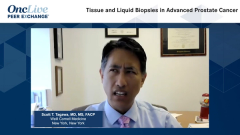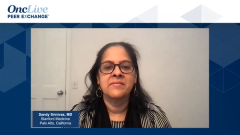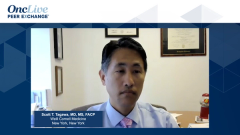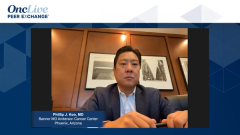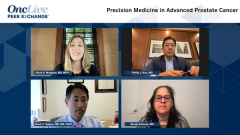
Treatment Advances in mCSPC
Treatment Advances in mCSPC
Episodes in this series

Alicia K. Morgans, MD, MPH: Let’s talk a little about our next segment, which is a focus on emerging data for castration-sensitive prostate cancer. We’ll start with a review of some of the therapies we have approved for intensification strategies for patients who are receiving ADT [androgen deprivation therapy] plus something, because that has become the standard of care and is something we should strive to do for all patients who are able. Scott, can you give us a brief overview of some of the trials that led to the approval of chemotherapy–hormonal therapy, ADT plus docetaxel?
Scott T. Tagawa, MD, MS, FACP: Sure. We knew for a long time that taxane chemotherapy with docetaxel improved patient-reported outcomes and survival in metastatic CRPC [castration-resistant prostate cancer], or what was called hormone refractory at the time. There was a short median number of months with a hazard ratio that was good but not tremendous. The same drug in a different setting not only improved the median but also significantly certainly improved the hazard ratio. There are a number of reasons for that mechanistically as well as having to do with less resistance, fewer mutations, etc, in the noncastrate setting. A smaller exposure, meaning 6 cycles, show a much bigger improvement in terms of overall survival.
With maintenance in a longer-term setting, at least looking at the CHAARTED study, when you look at some of the patient-reported outcomes for the year, it was better in the chemotherapy arm than the nonchemotherapy arm, probably because of the combination of recovery from chemotherapy toxicity as well as better control of the cancer. There’s a bit of a sacrifice in terms of patient-reported outcomes beginning during chemotherapy, but it’s worth it in the long run. Some of these data, at least when you look at the UK population, translates into lower-volume disease and node-only disease. That’s not clear in the US population. But in a broadly speaking high-risk, noncastrate population, there are data for long-term benefit from 6 cycles of docetaxel.
Alicia K. Morgans, MD, MPH: Fantastic. Sandy, can you tell us a little about the androgen receptor [AR]–targeted agents? Those are also highly effective and approved in this metastatic castration-sensitive setting.
Sandy Srinivas, MD: Sure, Alicia. Around the same time that we saw docetaxel make its entry into the hormone-sensitive space, 2 trials—the LATITUDE trial, which looked at abiraterone in the high-risk patient population, and the STAMPEDE trial from the United Kingdom—had very similar results. It was almost identical to docetaxel, where, as Scott said, abiraterone approved in metastatic CRPC had an overall survival benefit of barely 5 months. But in the hormone-sensitive space, it showed a pretty remarkable hazard ratio of close to 0.62 for patients with newly diagnosed metastatic hormone-sensitive disease. Both trials, STAMPEDE and LATITUDE, were very similar. Unlike the docetaxel argument, where we think about volume of disease, at least from the STAMPEDE trial, it appeared that all patients derive benefit from this ADT intensification. It’s not limited to patients with high-volume disease.
To go back, I want to mention about this idea of heterogeneity that we’ve been talking about. We know that there’s definitely a difference in outcome for patients who present with de novo disease with metastatic disease, as opposed to patients who had localized disease many years ago who now present with metastatic disease. They’re different, but both of them derive benefit from this ADT intensification with abiraterone.
Alicia K. Morgans, MD, MPH: Thank you. That was great. Apalutamide and enzalutamide are also approved in this setting. Scott, can you tell us a little about those?
Scott T. Tagawa, MD, MS, FACP: They’re 2 very similar androgen receptor–signaling inhibitors coming from the same laboratory that, similar to abiraterone and docetaxel, lead to a long-term overall survival benefit when added to up-front ADT. There are subtle differences in the way some of these trials were done, in terms of either allowing prior docetaxel in a small subset or giving the androgen receptor–signaling inhibitor concurrent with docetaxel, and also comparing with placebo vs comparing with bicalutamide. Overall, what’s most important for our patients and the general practitioner who’s treating the patients is that the addition of an AR pathway inhibitor in initial therapy leads to a major long-term difference. Not that we have 100% crossover data, but this is despite use of the same drugs in the CRPC setting. It’s a very important point that we want to add in early.
Transcript edited for clarity.


